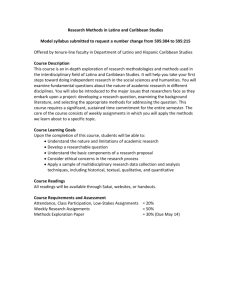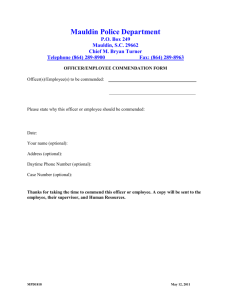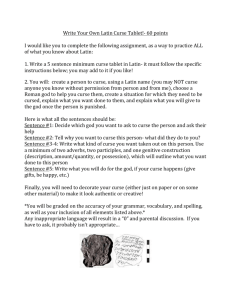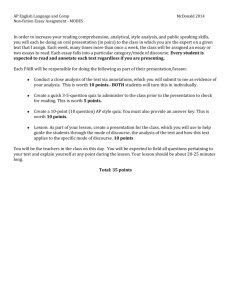Political Economy of Oil and other Resources
advertisement
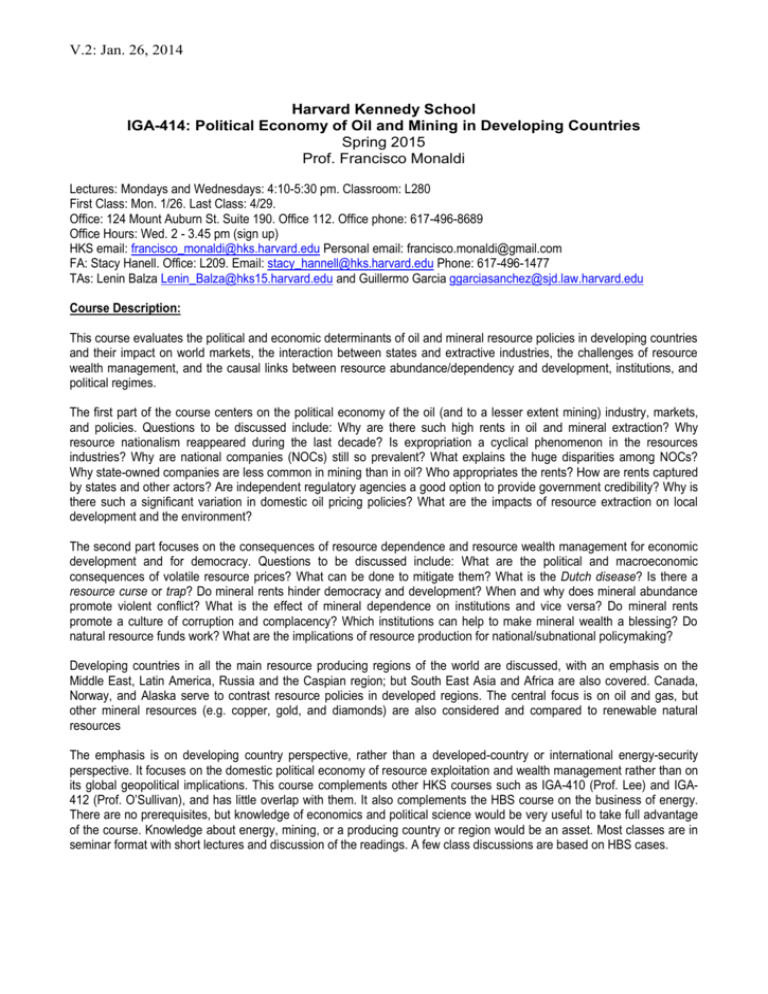
V.2: Jan. 26, 2014 Harvard Kennedy School IGA-414: Political Economy of Oil and Mining in Developing Countries Spring 2015 Prof. Francisco Monaldi Lectures: Mondays and Wednesdays: 4:10-5:30 pm. Classroom: L280 First Class: Mon. 1/26. Last Class: 4/29. Office: 124 Mount Auburn St. Suite 190. Office 112. Office phone: 617-496-8689 Office Hours: Wed. 2 - 3.45 pm (sign up) HKS email: francisco_monaldi@hks.harvard.edu Personal email: francisco.monaldi@gmail.com FA: Stacy Hanell. Office: L209. Email: stacy_hannell@hks.harvard.edu Phone: 617-496-1477 TAs: Lenin Balza Lenin_Balza@hks15.harvard.edu and Guillermo Garcia ggarciasanchez@sjd.law.harvard.edu Course Description: This course evaluates the political and economic determinants of oil and mineral resource policies in developing countries and their impact on world markets, the interaction between states and extractive industries, the challenges of resource wealth management, and the causal links between resource abundance/dependency and development, institutions, and political regimes. The first part of the course centers on the political economy of the oil (and to a lesser extent mining) industry, markets, and policies. Questions to be discussed include: Why are there such high rents in oil and mineral extraction? Why resource nationalism reappeared during the last decade? Is expropriation a cyclical phenomenon in the resources industries? Why are national companies (NOCs) still so prevalent? What explains the huge disparities among NOCs? Why state-owned companies are less common in mining than in oil? Who appropriates the rents? How are rents captured by states and other actors? Are independent regulatory agencies a good option to provide government credibility? Why is there such a significant variation in domestic oil pricing policies? What are the impacts of resource extraction on local development and the environment? The second part focuses on the consequences of resource dependence and resource wealth management for economic development and for democracy. Questions to be discussed include: What are the political and macroeconomic consequences of volatile resource prices? What can be done to mitigate them? What is the Dutch disease? Is there a resource curse or trap? Do mineral rents hinder democracy and development? When and why does mineral abundance promote violent conflict? What is the effect of mineral dependence on institutions and vice versa? Do mineral rents promote a culture of corruption and complacency? Which institutions can help to make mineral wealth a blessing? Do natural resource funds work? What are the implications of resource production for national/subnational policymaking? Developing countries in all the main resource producing regions of the world are discussed, with an emphasis on the Middle East, Latin America, Russia and the Caspian region; but South East Asia and Africa are also covered. Canada, Norway, and Alaska serve to contrast resource policies in developed regions. The central focus is on oil and gas, but other mineral resources (e.g. copper, gold, and diamonds) are also considered and compared to renewable natural resources The emphasis is on developing country perspective, rather than a developed-country or international energy-security perspective. It focuses on the domestic political economy of resource exploitation and wealth management rather than on its global geopolitical implications. This course complements other HKS courses such as IGA-410 (Prof. Lee) and IGA412 (Prof. O’Sullivan), and has little overlap with them. It also complements the HBS course on the business of energy. There are no prerequisites, but knowledge of economics and political science would be very useful to take full advantage of the course. Knowledge about energy, mining, or a producing country or region would be an asset. Most classes are in seminar format with short lectures and discussion of the readings. A few class discussions are based on HBS cases. V.2: Jan. 26, 2014 Course requirements: 1) Complete the required readings before each class and actively contribute to the class discussion, be prepared for cold calling. Comment the readings on the course webpage before the class, at least on 10 of the 25 classes, due by 10 am on the day of the class. The professor or TAs may pose questions on the readings, but for all classes there are two basic questions. A) What aspect of the readings did you find particularly interesting and insightful? and B) How do the readings apply or not to the country you follow? Readings marked as optional are not required, but doing them would increase the participation grade. 2) Follow a resource producing country (or region) assigned from a list of options. Possibly make brief presentations in class about it and be prepared to discuss the implications of each topic covered in class for the case of your assigned country. 3) Write a midterm take-home exam about resource industry policy. The exam question will be distributed on Mon. March 9h at the end of class and the answer is due at the start of the class on Wed. March 11th and as a Word document uploaded in the course webpage beforehand. 4) Write a policy memo. Either about how to improve the resource policies of a producing country or about how to improve the resource wealth management policies of a country. The memos should be 8-10 pages long. The basic structure of the memo should be: a) executive summary, b) description of the problem, c) technical evaluation of the policy options to mitigate it, d) political feasibility of the different options, and e) policy recommendation. The policy memo is due by 3 pm on Friday May 08h in hardcopy (leave at the FA’s office) and as a Word document uploaded in the course webpage. Course grading: 1. Midterm exam: 35% 2. Policy Memo: 35% 3. Class participation and web discussions: 30% Course materials: Required books: (sold at The Coop and available at the HKS Library Reserve) Arezki, R., T. Gylfason, and A. Sy (2011) Beyond the Curse: Policies to Harness the Power of Natural Resources. IMF. (in Webpage). Barma, N; K. Kaiser; T. Minh Le; and L. Vinuela (2012) Rents to riches? The Political Economy of Natural Resource-Led Development. World Bank. (in Webpage). Collier, P. (2010) The Plundered Planet. Oxford University Press. Ross, M. (2013) The Oil Curse. Princeton University Press. Optional books: (available at the Library Reserve) Hendrix, C. and M. Noland (2014) Confronting the Curse. Peterson Institute for International Economics. Yergin, D. (2011) The Quest: Energy, Security, and the Remaking of the Modern World. Penguin Books. Anderson, G. (ed.) (2012) Oil and Gas in Federal Systems. Oxford University Press. Daniel, P.; M. Keen, C. McPherson, eds. (2010) The Taxation of Petroleum and Minerals. Routledge. Davis, J.M., R. Ossowski, and A. Fedelino (2003) Fiscal Policy Formulation and Implementation in Oil Producing Countries. International Monetary Fund. Dunning, T. (2008) Crude Democracy. Cambridge University Press. Goldman, M. (2008) Petrostate. Oxford University Press. Heilbrunn, J. (2014) Oil, Democracy, and Development in Africa. Cambridge University Press. Hogan, W. and F. Sturzenegger (2010) The Natural Resources Trap. MIT Press. Humphereys, M., J. Sachs and J. Stiglitz (2007) Escaping the Resource Curse. Columbia University Press. Radetzki, M. (2008) Primary Commodities in the Global Economy. Cambridge University Press. V.2: Jan. 26, 2014 Sinnott, E., J. Nash, and A. De la Torre (2010) Natural resources in Latin America and the Caribbean. World Bank https://openknowledge.worldbank.org/bitstream/handle/10986/2482/555500PUB0Natu1EPI1991501801PUBLIC 1.pdf?sequence=1 Victor, D., D. Hults, and M. Thurber (2012) Oil and Governance. Cambridge University Press. Course content outline: 1. Introduction to oil and other extractive industries a. Introduction to the oil and gas industry: where and how it is produced. b. The historical evolution of the oil industry: actors and markets. c. Other mineral resources: copper, gold, and diamonds. 2. The determinants of oil and mining policies in developing countries a. Characteristics of the oil and mineral industries and their political economy implications i. Rents ii. Sunk costs iii. Changing risks iv. Enclaves and linkages v. Local and environmental impact vi. The commitment problem: political and regulatory risks b. States and international companies. c. Governments and state-owned companies d. NOC’s management and performance. Case studies: Pemex, Pdvsa, Petrobras, Saudi Aramco, Statoil, CNPC, CNOOC. Non-oil: Codelco (copper), Vale (mining), Gazprom (natural gas). e. Fiscal, contractual, and regulatory frameworks i. Government-take and investor take ii. Royalties, bonuses, and taxes iii. Progressive taxation iv. Taxation and revenue stability v. Types of contracts and regulatory institutions vi. Case studies: Norway, Mexico, Kazakhstan. f. Cycles of investment and expropriation. Case studies: Russia, Argentina, Ecuador, and Venezuela g. Resources, nationalism, and populism h. Commodity price cycles and policies i. Local content policies j. Domestic pricing: subsidies and consumption taxes. Case studies: Nigeria and Iran k. National versus regional governments. Case studies: Canada, Nigeria, Peru, Argentina and Russia l. The new role of China, India, and other commodity importers, in exporting countries 3. The effects of oil and mineral dependence on development: is there a resource curse? a. b. c. d. e. f. g. h. i. j. Abundance vs. dependence Natural resources and economic growth: oil, minerals and agricultural resources Dutch disease, exchange rate appreciation, and volatility Extractive industries, national capacities, externalities, and diversification Resources, state capacities, and development policies Fiscal voracity and volatility Wealth management and stabilization policies Rent-seeking and corruption Cash transfers. Case studies: Alaska, Iran. Case studies: MENA countries, Botswana, Kazakhstan, Chile, Indonesia. V.2: Jan. 26, 2014 4. Resource wealth, politics, and institutions a. b. c. d. e. f. Democracy, authoritarianism, and resource dependence: does oil fuel authoritarianism? Inequality, resources, and democracy Resource dependence, property rights, and institutions Resources and violent conflict in Africa Democratic institutions and resource wealth i. Institutions and the stakes of power ii. Regime structure iii. Patronage, civil society, and social capital iv. NOC’s governance v. Independent regulatory agencies vi. Fiscal rules, stabilization, and transparency vii. Resources, federalism, and subnational authorities viii. Cash transfers ix. External institutions x. Culture and resource wealth Case studies: Norway, Chad, Chile, Russia. 5. The future of extractive industries: implications for developing countries a. b. c. d. Climate change Local communities Price cycles Technological change Course reading list: The course readings are available in two formats: readings in required books (B) and readings available at the course webpage (W). 1. Introduction to oil and other extractive industries Class 1: Monday, January 26. Course overview and introduction. Required: Barma, N. et al. (2012) Ch. 1, pp.1-30 (B) Collier, P. (2010) Ch. 1 to 3, pp. 3-62 (B) Class 2: Wed. Jan. 28. Introduction to the oil and gas markets and industry. Required: Maugeri, L. (2010). Ch. 1, pp. 3-34 (W) HBS Case Study. Filling the Empty Quarter: Saudi Aramco and the World Oil Market. N. Maurer (2010). 708048. (W) Espinasa, R and C. Sucre. Long Term Dynamics of Crude Oil Prices. IDB TN-726. Dec. 2014. (W) Optional: Yergin, D. (2012). The Quest. Chs. 6, 8, and 16. (B) Class 3: Mon. Feb. 2. Perspectives on other resources. Required: Radetzki, M. “Primary Commodities: historical perspectives and prospects” in Arezki, R. et al. (2011) Ch. 3, pp. 35-48 (B) V.2: Jan. 26, 2014 HBS Case Study: Vale: Global Expansion in the Challenging World of Mining (A) and (B) A. Musacchio, T. Khanna, R. Reisen de Pinho (2012) Cases: 713012 and 710054. (W) Optional: Lee, B., F. Preston, J. Kooroshy, R. Bailey and G. Lahn (2012) Resources Futures. Chatham House, December. Ch. 1 to 3, pp. 1-58. 2. The determinants of oil and mining policies in developing countries Class 4: Wed. Feb. 4. Characteristics of the oil and mineral industries and their political economy implications. Required: Barma, N. et al. (2012) Ch. 2, pp. 39-73 (B) Manzano, O. and F. Monaldi (2008) “The Political Economy of Oil Production in Latin America,” Economia, Vol. 9, No. 1. pp. 74-80. (W) Sinnott, E. et al. (2010) Ch. 1, pp. 1-4. (W) Class 5: Mon. Feb. 9. Recent Developments in the Oil Market Required: World Bank Global Economic Prospects. Understanding the Plunge in Oil Prices. Pp. 155-164 (W) Goldman Sachs. Lower for Longer. Jan 2015. (W) Class 6: Wed. Feb. 11. States and National oil companies. Required: Victor, D. et al. (2012). Ch. 4 and 20, pp. 121-170 and 887-928 (W) Optional: Yergin, D. (2012) The Quest. Ch. 4, pp.84-107 (B) Class 7: Wed. Feb. 18. Pemex and the Mexican oil reform. Required: HBS Case Studies. Pemex (A) and (B). N. Maurer and A. Musacchio (2012) 713051 and 713052 (W) Optional: De Oliveira, A. “Petrobras” in Victor, D. et al. (2012) Ch. 12, pp. 515-556. Hults, D. “PDVSA” in Victor, D. et al. (2012) Ch. 10, pp. 418-477. Class 8: Mon. Feb. 23. The Chinese NOCs. Required: HBS Case Study: CNOOC: Building a World-Class Energy Company. J Bower et al. (2012). Case: 9311074. (W) Hendrix, C. and M. Noland (2014) Ch. 5, pp. 69-89. (B) Optional: Yergin, D. (2012) The Quest. Ch. 9-10, pp.190-226. (B) Jiang, B. “CNPC” in Victor, D. et al. (2012) Ch. 9, pp. 379-417 (W) Class 9. Wed. Feb. 25. Oil contracts and institutions: The Case of Kazakhstan. Required: Barma, N. et al. (2012) Ch. 3, pp. 77-110 (B) Collier, P. (2010) Ch. 4, pp. 63-77 (B) HBS Case Study: The Kashagan Production Sharing Agreement (PSA). B. Esty and F. Bitsch (2013). Case: 9213-082. (W) Optional: Yergin, D. (2012). The Quest. Ch. 3, pp.65-73. (B) V.2: Jan. 26, 2014 Class 10. Mon. March 2. Oil and mining taxation Required: Barma, N. et al. (2012) Ch. 4, pp. 113-159 (B) Collier, P. (2010) Ch. 5, pp. 79-95 (B) McKinsey Global Institute (2013). Reverse the curse. pp. 61-69.(W) Optional: Daniel, P. et al. (2010) Ch. 3 and 4, pp. 75-121 Class 11. Wed. March 4. Resource nationalism and expropriation Required: Manzano, O and F. Monaldi (2010) “The Political Economy of Oil Contract Renegotiation in Venezuela” in Hogan, W. and F. Sturzenegger (2010) Ch. 12. pp. 409-454. (W) HBS Case Studies: Petrobras in Ecuador (A), (B) and (C) (2009). A. Musacchio and L. Goldberg. Cases: 309107, 309108, and 310029. (W) Optional: Warshaw, C. “The political economy or expropriation and privatization in the oil sector” in Victor, D et al. (2012). Ch. 2, pp. 33-61. Class 12. Mon. March 9. The Cases of Repsol-YPF in Argentina and Shell-Gazprom in Russia. Required: HBS Case Study: YPF-The Argentine Oil Nationalization of 2012. N. Maurer and G. Herrero (2013) Case: 9713029. (W) HBS Case Studies: Journey to Sakhalin: Royal Dutch/Shell in Russia (A), (B) and (C). R. Abdelal. Cases: 9704040, 9706013, and 9707038 (W) Optional: Yergin, D. (2012). The Quest. Ch. 1, pp. 21-43. (B) TAKE-HOME MIDTERM EXAM DISTRIBUTED AT THE END OF CLASS: Mon. March 9th. Class 13. Wed. March 11. The Shale Revolution and the Oil and Gas Markets. Guest lecture by Leonardo Maugeri Optional: Maugeri, L. Oil: The Next Revolution. Belfer Center. 2012. http://belfercenter.ksg.harvard.edu/files/Oil-%20The%20Next%20Revolution.pdf Maugeri, L. The Shale Oil Boom. Belfer Center. 2013. http://belfercenter.ksg.harvard.edu/files/The%20US%20Shale%20Oil%20Boom%20Web.pdf MIDTERM DUE AT START OF CLASS: Wed. March 11th. **SPRING BREAK** Class 14. Mon. March 23. Domestic pricing of oil and gas. Required: Gupta, S. et al. “Issues in domestic petroleum pricing in oil-producing countries” in Davis, J.M. et al. (2003) Ch. 14, pp. 383 – 415. (W) Guillaume, D., R. Zytek, and M. Reza Farzin “Iran–The Chronicles of the Subsidy Reform” IMF Working Paper. WP/11/167, pp. (W) http://www.imf.org/external/pubs/ft/wp/2011/wp11167.pdf V.2: Jan. 26, 2014 3. The effects of oil and mineral dependence on development: is there a resource curse? Class 15. Wed. March 25. The resource curse. Required: Frankel, J. (2010) “The Natural Resource Curse: a survey” RWP10-005, HKS, pp. 3-34 (W) Ross, M. (2012). Ch. 1 and 2, pp. 1-62 (W) Optional: Hendrix, C. and M. Noland (2014) Ch. 2, pp. 9-26. Class 16. Mon. March 30. Macroeconomics of resource dependence. Required: Sachs, J. “How to handle the Macroeconomics of Oil Wealth” in Humphereys, M. et al. (2007) Ch. 7, pp. 173-193. (W) Eifert, B. et al. “The Political Economy of Fiscal Policy and Economic Management in Oil-Producing Countries” in Davis, J. et al. (2003) Ch. 4, pp. 82-122 (W) Class 17. Wed. April 1. Resource wealth management and resource funds. Required: Ekeli, T. and A. Sy “The Economics of Sovereign Wealth Funds: Lessons from Norway” in Arezki, R. et al. (2011) Ch. 6. Pp. 107-115 (B) Humphereys, M. et al. “The Political Economy of Natural Resource Funds” in Humphereys, M. et al. (2007) Ch. 8, pp. 194-234. (W) Class 18. Mon. April 6. Resource dependence and development policies. Required: Gelb, A. “Economic Diversification in Resource Rich Countries” in Arezki, R. et al. (2011) Ch. 4, pp.5377 (B) Collier, P. (2010) Ch. 6 and 7, pp. 97-149 (B) McKinsey Global Institute (2013). Reverse the curse. pp. 89-125.(W) Optional: Barma, N. et al. (2012) Ch. 5 and 6, pp.165-235 (B) Class 19. Wed. April 8. Alternative solutions to the resource curse: privatization and cash transfers. Required: Moss, T. (2011) “Oil to Cash: Fighting the Resource Curse through Cash Transfers” Center for Global Development Working Paper # 237, Washington D.C. (W) http://www.cgdev.org/files/1424714_file_Oil2Cash_primer_FINAL.pdf Weinthal, E. and P. Jones Luong (2006) “Combating the Resource Curse: An Alternative Solution to Managing Mineral Wealth” Perspectives on Politics. Vol. 4, No. 1, pp. 35-53. (W) Optional: Hendrix, C. and M. Noland (2014) Ch. 6 and 7, pp. 91-120 4. Resource wealth, politics, and institutions Class 20. Mon. April 13. Do resource rents hinder democracy? Required: Ross, M. (2012) Ch. 3, pp. 63-93 (B) Friedman, T. (2006) “The First Law of Petropolitics” Foreign Policy, May-June (4 pages). (W) http://www.foreignpolicy.com/articles/2006/04/25/the_first_law_of_petropolitics?page=0,0 Haber, S. and V. Menaldo (2011) “Do Natural Resources Fuel Authoritarianism? A Reappraisal of the Resource Curse” American Political Science Review. Vol. 105, Issue 01, pp.1-26. (W) Optional: V.2: Jan. 26, 2014 Hendrix, C. and M. Noland (2014) Ch. 3, pp. 27-50. Class 21. Wed. April 15. Resources and violence. Required: Ross, M. (2012) Ch. 5, pp.145-178. (B) Optional: Hendrix, C. and M. Noland (2014) Ch. 4, pp. 59-66. Class 22. Mon. April 20. Institutions and resource dependent countries. Required: Ross, M. (2012) Ch. 6 and 7, pp.189-253 (B) Torvik, R. “The Political Economy of Reform in Resource Rich Countries” in Arezki, R. et al. (2011) Ch. 13, pp. 235-254 (B) Class 23. Wed. April 22. Case Studies: The Arab GCC countries and Angola Required: HBS Case Study: Angola and the Resource Curse. A. Musacchio, E. Werker, J. Schlefer. 2010. Case: 711016. (W) HBS Case Study: Saudi Arabia: Modern Reform, Enduring Stability. R. Vietor and N. Forrest. 2010. Case: 9709042. (W) HBS Case Study: Dubai: Global Economy. R. Vietor and N. Forrest. 2010. Case: 9709043. (W) 5. The future of resource exploitation: implications for resource abundant countries Class 24. Mon. April 27. The future of oil and mining. Required: Lee, B., F. Preston, J. Kooroshy, R. Bailey and G. Lahn (2012) Resources Futures. Chatham House, December. Ch. 4 to 7, pp. 62-163. (W) Collier, P. (2010) Ch. 9 and 11, pp. 173-203 and 229-243 (B) Class 25. Wed. April 29. Course wrap up. POLICY MEMO DUE ON Friday. MAY 8th.






